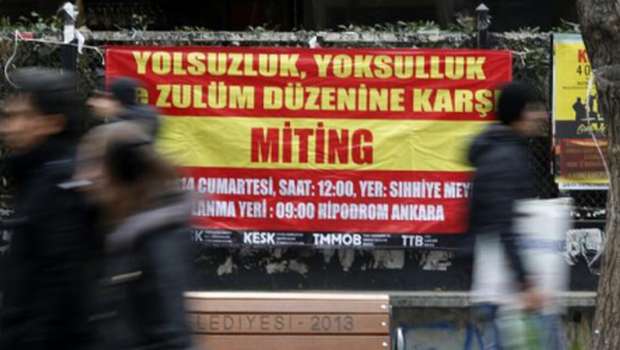
A protest banner in Ankara reads: “Meeting against corruption, poverty and the injust system.” (REUTERS/Umit Bektas)
Istanbul, Reuters—Turkey’s purge of the judiciary and police has brought a corruption investigation shaking the government to a grinding halt and could undermine confidence in state institutions, senior legal figures and the opposition said on Wednesday.
Ninety-six judges and prosecutors were reassigned overnight, the biggest purge of the judiciary since a graft scandal erupted on December 17 with the arrest of businessmen close to Prime Minister Recep Tayyip Erdoğan and three ministers’ sons.
Erdogan has portrayed the corruption inquiry as an attempted “judicial coup” orchestrated by US-based cleric Fethullah Gülen, whose network of sympathizers hold considerable sway in many parts of the state, including the police and legal system.
The government’s response, transferring thousands of police officers and seeking to tighten its grip on the courts, has brought sharp criticism from the European Union, which Turkey has been seeking to join for decades, and rattled investors, helping send the lira to record lows.
“Turkey is ablaze with the justice agenda,” said Metin Feyzioğlu, chairman of the Turkish bar association.
“Everyone in the country has started to ask when there is an investigation or trial what side the judge, prosecutor or police officer is on,” he said. “The foundation of the state and the country’s legal order has been shaken.”
European Commission President José Manuel Barroso told Erdoğan, on his first visit to Brussels in five years on Tuesday, that respect for rule of law and independence of the judiciary were basic principles of democracy and essential conditions for EU membership.
Erdoğan, a feisty leader who bristles at open criticism, scolded EU leaders for raising the dispute in public.
The roughly 120 judges and prosecutors reassigned since the graft scandal broke make up a fraction of the 13,000 working in Turkey as a whole, but the move has put sensitive cases on hold and shaken confidence within the profession.
“While the government claims that it is fighting against a parallel structure, it is actually closing off the corruption investigations . . . It is taking away those who know their cases best. It causes a great deal of harm,” said Murat Arslan, chairman of the YARSAV association of judges and prosecutors.
“It is quite clear there is political intervention here . . . they are quite clearly intimidating the whole of the judiciary. It is sending the message that ‘you cannot conduct an investigation which touches me,'” he told Reuters.
The state plays a strong role in Turkish political culture, often at the expense of individual liberties. The sight of open institutional feuding can only raise public concern where crises in the past have taken the form of army coups.
Erdoğan has essentially banished the army from politics in 11 years in power. His popularity seems as yet largely unaffected by the current turmoil and there is no sign of the summer demonstrations that shook his government reigniting on a similar scale. He will, in short, be trusting voters will flee towards the elected power.
Judges and prosecutors across the country—from Istanbul in the west to the southeastern city of Diyarbakır, and from the southern border region with Syria to the northern Black Sea coast—were reassigned in the move announced late on Tuesday.
The High Council of Judges and Prosecutors (HSYK), already headed by the justice minister and set to fall further under government control under a ruling party bill before parliament, said the 96 were being transferred to new locations.
The government denied involvement.
“These appointments have absolutely nothing to do with our ministry. This is completely at the discretion of the relevant [HSYK] chamber,” a senior justice ministry official said.
Arslan estimated around half of those moved may have applied for a transfer, but said others were given no prior notice, finding out from the HSYK website. They were given two weeks to move if their appointment was in another province, otherwise were expected to start their new role the same day.
Nearly 500 police, mostly in Ankara, were also removed from their posts and reassigned on Wednesday, media reports said, bringing the total since December 17 to several thousand.
Erdoğan’s supporters say the police and judiciary are dominated by Gülen sympathizers and that the government’s actions strengthen not weaken their independence. Erdoğan himself refers to a “parallel state” within the judiciary.
But Aykut Erdoğdu, the chief corruption investigator for the main opposition CHP, said the purge had become so broad that many of those removed were not even linked to Cemaat.
“We’ve reached the point where members of these institutions are unable to do their job,” Erdoğdu told Reuters.
“More important is the damage done to these institutions. It can take decades to build up competent staff to run the institutions of state. Moreover, it will take years to undo the memory of this among prospective candidates in the future.”
Among those reassigned overnight was the chief prosecutor in the major western city of Izmir, Huseyin Bas, who had been handling a corruption investigation into the state railway company. He was transferred to Samsun on the Black Sea.
CHP leader Kemal Kılıçdaroğlu held up in parliament on Tuesday what he said was a “horrifying” statement written by Bas saying the justice ministry had demanded he halt the probe.
Justice Minister Bekir Bozdağ acknowledged his undersecretary had called the prosecutor but denied there was any request to stop the inquiry.
